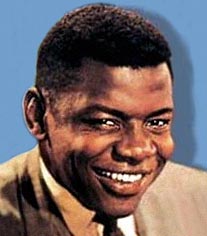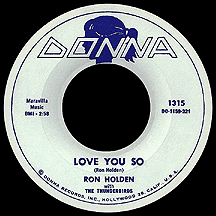RON HOLDEN
Love You So
The events of Ron Holden's life didn't go exactly as planned. For one thing, he spent three months in jail. Then there was a little problem with his first wife; his incarceration didn't bother her, but she divorced him when the big bucks didn't come rolling in from his music career. Things got better after that, but time was at a premium...he died at the age of 57. All in all, Ron probably had more excitement during his lifetime than the average person.
Ron's father, Oscar Holden, was born in Nashville in 1886 or '87 (accounts of his year of birth vary). During his formative years he vowed to leave the south at the first opportunity in the hopes of raising a family as far away as possible from the prejudices and hardships of southern life. A top-flight piano player and multi-instrumentalist, he was a member of Jelly Roll Morton's band in the late 1910s (playing clarinet, since Morton was himself a pianist). During a tour stop in Seattle in 1919 he decided to stay, finding plenty of work in the city's nightclubs. Later he married and raised a large family; Ron came along in 1939. Most of his children went on to have music careers. Unfortunately, Oscar isn't widely remembered outside the Pacific Northwest, but he was an early influence on Ray Charles, who lived and performed in Seattle during the late 1940s and got to know Oscar quite well, patterning his own piano playing technique on the elder Holden's example.
With his dad's help, Ron learned to play the trombone. He formed his own band, The Playboys, in 1957 at Garfield High, where he was also a star on the football team. The group's fiercest competition in those days came from The Frantics, Seattle's hottest late-'50s rock combo (chalking up three instrumental hits in 1959 and '60 on Dolton Records). Around 1959, realizing they weren't reaching the same level as the Frantics (or the up-and-coming Ventures for that matter), the Playboys felt they were, at least, the best rockin' band of black kids in the Puget Sound area.
During a break one night in 1959 at a show where they were performing, the guys went out to the parking lot to have a few drinks (and do a little "custom" cigarette rolling) when the police showed up and took 18-year-old Ron away, charging him with contributing to the deliquency of minors (the others were all a year or two younger). The judge gave him 90 days, which he served in the King County Jail. During his time there he met Larry Nelson, a sheriff's deputy by day and doo wop singer by night who'd waxed a single for Aladdin Records, "One Touch of Heaven," with interracial group The Shades (from nearby Everett, Washington), just months before. The record had managed a little airplay in Seattle but didn't catch on in many areas. Larry, recently married, took the deputy's jailhouse job but didn't give up on his music industry dream.

Nelson overheard Holden singing doo wop harmonies with other inmates and thought they were pretty good, especially on one melodic tune Ron had written with simple, romantic lyrics ('We have a love that's sure to be...true love for all eternity'). The two struck up a friendship and after Ron finished his term late in the year they got together to record the song with the plan being to press the single locally on Nite Owl, a new label Nelson and fellow Shades singer Chuck Markulis had started. But the Playboys hadn't waited around for Ron's release and were already gigging with a new lead singer. Nelson hooked him up with a new band, The Thunderbirds, featuring a flamboyant frontman named Little Willie Bell.
A recording session was held at Fred Rasmussen's home, set up like a studio and listed in the Yellow Pages under "Acme Sound." A long, grueling day attempting take after take of the cool jail song finally resulted in "Love You So," featuring a Latin beat along the lines of "Little Darlin'" by The Gladiolas, plus a few other tracks including 180-degree turn "My Babe," nothing less than a wildly rockin' uptempo scorcher mostly improvised ('My babe! My babe-my babe! My babe...she's comin' back home! Yeah, my babe...'), showcasing Holden's raspy growl, possibly caused by half a day of nonstop singing. Unrefined but not unprofessional, it's one of the most incredible A-and-B side combinations of the era. Both sides of the Nite Owl 45 broke onto the Seattle airwaves in November '59, piquing the interest of Bob Keane, whose Del-Fi Records of Los Angeles picked up the single for national distribution on Donna (a subsidiary label named after the company's biggest hit by Ritchie Valens).
"Love You So" debuted on the national charts in April 1960 and made a steady climb, reaching the top ten in June. It was the first hit on Donna and biggest the label ever had. Ron relocated to Los Angeles and began to live it up. A second single, "Gee, But I'm Lonesome" (written by Bruce Johnston, future member of Bruce and Terry, The Rip Chords and The Beach Boys), omitted label credit to the Thunderbirds, and indeed the ballad sounded nothing like either side of the first record. The song got quite a bit of airplay on the west coast but only "Bubbled Under" nationally. The flip, "Suzie Jane," had a nice midtempo shuffle and sounded completely different from the other three. Later in the year Ron did a Christmas tune, "Who Says There Ain't No Santa Claus?," a little mentally unhinged tomfoolery with no parallel to previous Holden sides, nor did it have much in common with your typical seasonal selection beyond the jolly fat guy mentioned in the title. Seems Holden was determined to make sure every song he recorded was sonically at odds with the ones that came before.
After five Donna releases, the company dropped him. He made records over the next few years for the Eldo, Baronet, Rampart and Challenge labels, but the momentum was lost and it didn't appear there would be another hit record. He'd married a disgruntled golddigger, then later wed a woman more grounded in reality. Another shot at fame came in 1974; his recording on the Now label of the slow, sensual "Can You Talk" (similar in theme to Billy Paul's "Me and Mrs. Jones") had a respectable run on the R&B charts. He returned to Seattle later in the decade and reopened Dave's 5th Avenue jazz club (a hot hangout in the '50s) as Ron's 5th Avenue, where he often performed and booked many R&B and jazz acts. Ron Holden kept doing shows until his death from a heart attack in January 1997 at Rosarito Beach in Baja California, where he had been scheduled for a resort engagement.


